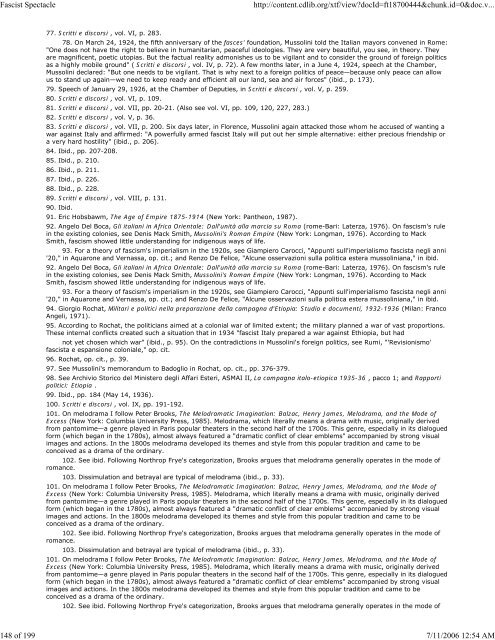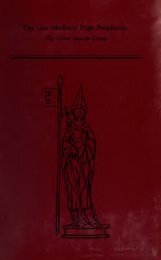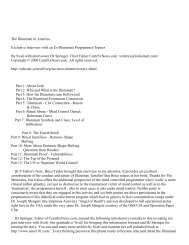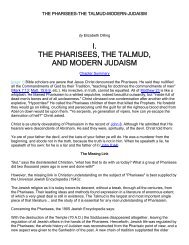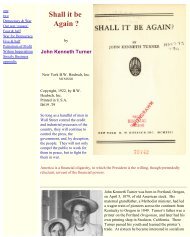You also want an ePaper? Increase the reach of your titles
YUMPU automatically turns print PDFs into web optimized ePapers that Google loves.
<strong>Fascist</strong> <strong>Spectacle</strong> http://content.cdlib.org/xtf/view?docId=ft18700444&chunk.id=0&doc.v...<br />
77. Scritti e discorsi , vol. VI, p. 283.<br />
78. On March 24, 1924, the fifth anniversary of the fasces' foundation, Mussolini told the Italian mayors convened in Rome:<br />
"One does not have the right to believe in humanitarian, peaceful ideologies. They are very beautiful, you see, in theory. They<br />
are magnificent, poetic utopias. But the factual reality admonishes us to be vigilant and to consider the ground of foreign politics<br />
as a highly mobile ground" ( Scritti e discorsi , vol. IV, p. 72). A few months later, in a June 4, 1924, speech at the Chamber,<br />
Mussolini declared: "But one needs to be vigilant. That is why next to a foreign politics of peace—because only peace can allow<br />
us to stand up again—we need to keep ready and efficient all our land, sea and air forces" (ibid., p. 173).<br />
79. Speech of January 29, 1926, at the Chamber of Deputies, in Scritti e discorsi , vol. V, p. 259.<br />
80. Scritti e discorsi , vol. VI, p. 109.<br />
81. Scritti e discorsi , vol. VII, pp. 20-21. (Also see vol. VI, pp. 109, 120, 227, 283.)<br />
82. Scritti e discorsi , vol. V, p. 36.<br />
83. Scritti e discorsi , vol. VII, p. 200. Six days later, in Florence, Mussolini again attacked those whom he accused of wanting a<br />
war against Italy and affirmed: "A powerfully armed fascist Italy will put out her simple alternative: either precious friendship or<br />
a very hard hostility" (ibid., p. 206).<br />
84. Ibid., pp. 207-208.<br />
85. Ibid., p. 210.<br />
86. Ibid., p. 211.<br />
87. Ibid., p. 226.<br />
88. Ibid., p. 228.<br />
89. Scritti e discorsi , vol. VIII, p. 131.<br />
90. Ibid.<br />
91. Eric Hobsbawm, The Age of Empire 1875-1914 (New York: Pantheon, 1987).<br />
92. Angelo Del Boca, Gli italiani in Africa Orientale: Dall'unità alla marcia su Roma (rome-Bari: Laterza, 1976). On fascism's rule<br />
in the existing colonies, see Denis Mack Smith, Mussolini's Roman Empire (New York: Longman, 1976). According to Mack<br />
Smith, fascism showed little understanding for indigenous ways of life.<br />
93. For a theory of fascism's imperialism in the 1920s, see Giampiero Carocci, "Appunti sull'imperialismo fascista negli anni<br />
'20," in Aquarone and Vernassa, op. cit.; and Renzo De Felice, "Alcune osservazioni sulla politica estera mussoliniana," in ibid.<br />
92. Angelo Del Boca, Gli italiani in Africa Orientale: Dall'unità alla marcia su Roma (rome-Bari: Laterza, 1976). On fascism's rule<br />
in the existing colonies, see Denis Mack Smith, Mussolini's Roman Empire (New York: Longman, 1976). According to Mack<br />
Smith, fascism showed little understanding for indigenous ways of life.<br />
93. For a theory of fascism's imperialism in the 1920s, see Giampiero Carocci, "Appunti sull'imperialismo fascista negli anni<br />
'20," in Aquarone and Vernassa, op. cit.; and Renzo De Felice, "Alcune osservazioni sulla politica estera mussoliniana," in ibid.<br />
94. Giorgio Rochat, Militari e politici nella preparazione della campagna d'Etiopia: Studio e documenti, 1932-1936 (Milan: Franco<br />
Angeli, 1971).<br />
95. According to Rochat, the politicians aimed at a colonial war of limited extent; the military planned a war of vast proportions.<br />
These internal conflicts created such a situation that in 1934 "fascist Italy prepared a war against Ethiopia, but had<br />
not yet chosen which war" (ibid., p. 95). On the contradictions in Mussolini's foreign politics, see Rumi, "'Revisionismo'<br />
fascista e espansione coloniale," op. cit.<br />
96. Rochat, op. cit., p. 39.<br />
97. See Mussolini's memorandum to Badoglio in Rochat, op. cit., pp. 376-379.<br />
98. See Archivio Storico del Ministero degli Affari Esteri, ASMAI II, La campagna italo-etiopica 1935-36 , pacco 1; and Rapporti<br />
politici: Etiopia .<br />
99. Ibid., pp. 184 (May 14, 1936).<br />
100. Scritti e discorsi , vol. IX, pp. 191-192.<br />
101. On melodrama I follow Peter Brooks, The Melodramatic Imagination: Balzac, Henry James, Melodrama, and the Mode of<br />
Excess (New York: Columbia University Press, 1985). Melodrama, which literally means a drama with music, originally derived<br />
from pantomime—a genre played in Paris popular theaters in the second half of the 1700s. This genre, especially in its dialogued<br />
form (which began in the 1780s), almost always featured a "dramatic conflict of clear emblems" accompanied by strong visual<br />
images and actions. In the 1800s melodrama developed its themes and style from this popular tradition and came to be<br />
conceived as a drama of the ordinary.<br />
102. See ibid. Following Northrop Frye's categorization, Brooks argues that melodrama generally operates in the mode of<br />
romance.<br />
103. Dissimulation and betrayal are typical of melodrama (ibid., p. 33).<br />
101. On melodrama I follow Peter Brooks, The Melodramatic Imagination: Balzac, Henry James, Melodrama, and the Mode of<br />
Excess (New York: Columbia University Press, 1985). Melodrama, which literally means a drama with music, originally derived<br />
from pantomime—a genre played in Paris popular theaters in the second half of the 1700s. This genre, especially in its dialogued<br />
form (which began in the 1780s), almost always featured a "dramatic conflict of clear emblems" accompanied by strong visual<br />
images and actions. In the 1800s melodrama developed its themes and style from this popular tradition and came to be<br />
conceived as a drama of the ordinary.<br />
102. See ibid. Following Northrop Frye's categorization, Brooks argues that melodrama generally operates in the mode of<br />
romance.<br />
103. Dissimulation and betrayal are typical of melodrama (ibid., p. 33).<br />
101. On melodrama I follow Peter Brooks, The Melodramatic Imagination: Balzac, Henry James, Melodrama, and the Mode of<br />
Excess (New York: Columbia University Press, 1985). Melodrama, which literally means a drama with music, originally derived<br />
from pantomime—a genre played in Paris popular theaters in the second half of the 1700s. This genre, especially in its dialogued<br />
form (which began in the 1780s), almost always featured a "dramatic conflict of clear emblems" accompanied by strong visual<br />
images and actions. In the 1800s melodrama developed its themes and style from this popular tradition and came to be<br />
conceived as a drama of the ordinary.<br />
102. See ibid. Following Northrop Frye's categorization, Brooks argues that melodrama generally operates in the mode of<br />
148 of 199 7/11/2006 12:54 AM


